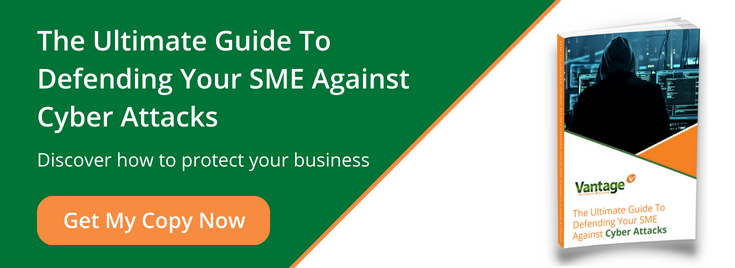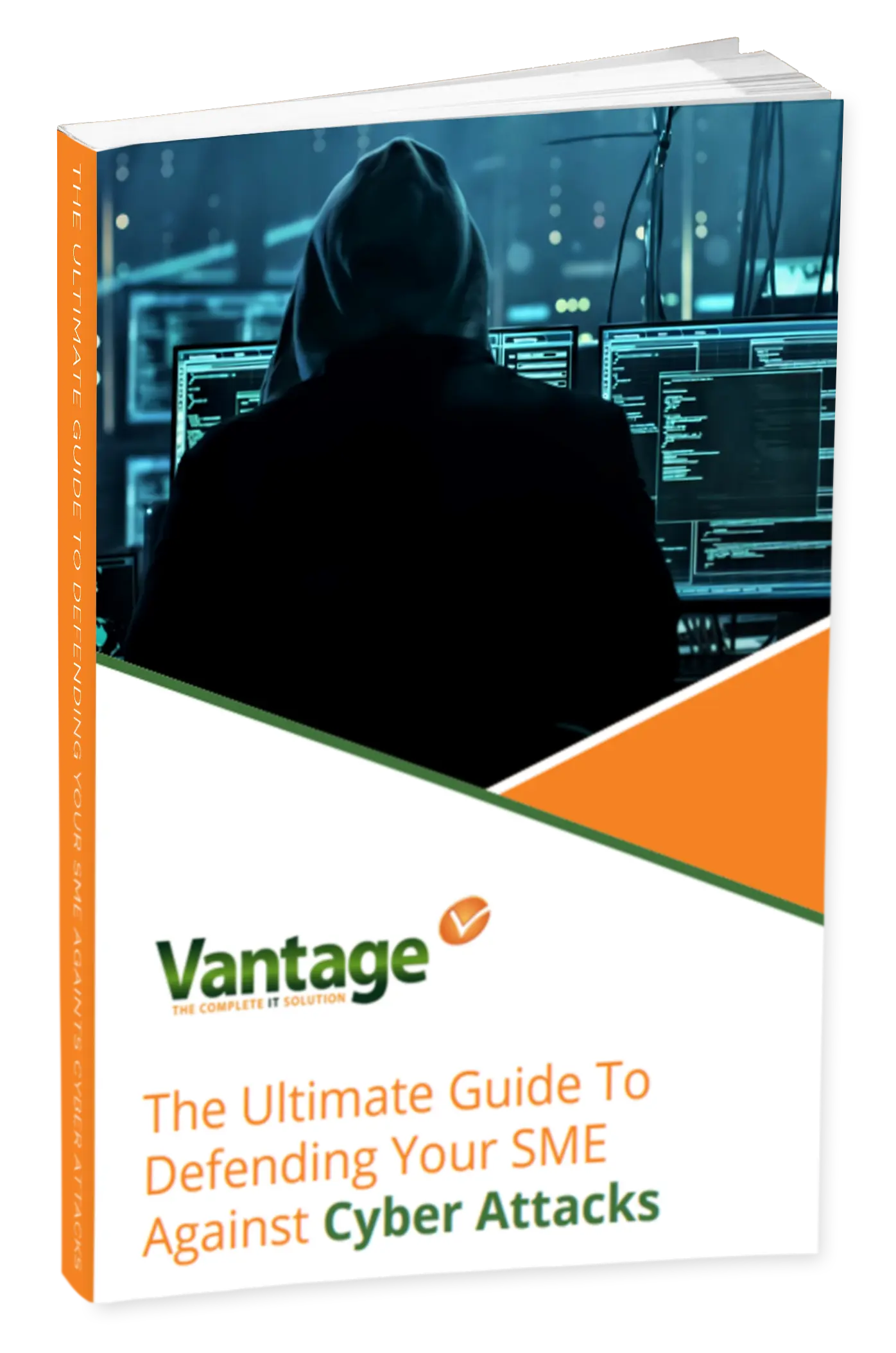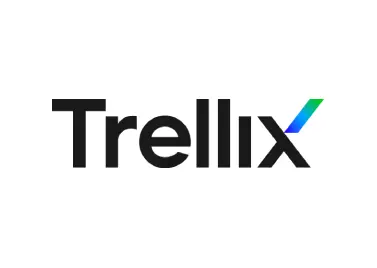5: Over a Decade of Supporting a Growing Customer
Most of our customers have been with Vantage IT for many years, developing great relationships and growing together. One of our first customers, a Mil...
The Ultimate Guide To Defending Your SME Against Cyber Attacks
Why Is Cyber Security Important?
The Five Most Common Cyber Security Threats
Preventative Measures Your Business Should Be Taking
What Is Cyber Insurance And Why Do I Need It?
Choosing a Cyber Security Partner Is All About Trust
More businesses than you think have suffered with a cyber attack, which is why it is important you know how to defend SME from them. If you want to combat these attacks and ensure they do not have any negative impacts on your business, carry on reading to recognise common security threats and the measures your company should be making.

In the modern day, it has never been more important to make cyber security a priority. While this should be important whenever we go online or use any kind of device, it is especially vital for businesses. Understanding what cyber security is and why it matters for your company can help you to protect your business – and choosing the right cyber security partner is an essential part of this.
Cyber security can cover more areas of your business than you might think, with cyberattacks being possible from a range of different angles.
Cyber security covers both your hardware and your software. It protects both the devices and online services you use from falling prey to theft or damage that could leave you vulnerable. This includes stopping unauthorised outsiders from being able to access your data, whether that be the information of your clients and customers, or your employees and investors. This is extremely important for every business, as leaked data could be as private as credit card information, home addresses, proof of ID, and other personal details.
When you use cyber security for businesses, you want to prevent potential hackers from being able to access vital parts of your company’s information. Now that nearly everything is stored online, with more and more companies going paperless, this could include highly confidential information and intellectual property, as well as your passwords and logins, financial data, and any sensitive information you are storing. Good cyber security significantly reduces the risks of storing and using such data.
If any information were to be accessed by hackers and either leaked or made inaccessible, this can lead to major consequences for your business. Sensitive data that’s been leaked, which may contain intellectual property and ideas for future projects, can lead to identity theft, financial fraud, and more. Even one of these occurrences can damage both the internal and public perception of your company. Financial losses and a loss of reputation can be extremely costly, as can the time it takes to investigate and remedy such incidences.
And this isn’t a niche issue that is unlikely to happen to you – as recently as 2020, nearly 4000 data breaches were reported, and it is worth noting that many more will have been kept quiet due to businesses seeking to retain a positive public image.
Hackers and other threats to your cyber security are growing and changing every day. Especially over the past few years, these threats adapt to infiltrate your systems and are becoming increasingly difficult for the average employee to detect – with these five common cyber security threats continuing to present issues for every company.
Phishing attacks are one of the most prevalent threats to cyber security. These usually come in the form of fraudulent emails, which request the recipient to share information. This can be passwords, changing details of employees, financial payment information from clients or suppliers, or even just asking for bank details outright. Often these phishing scams will appear to be from someone within the company, or a trusted external party.
Malware is an easy threat to miss, and it usually comes in the form of an email attachment, or website download. Even those with some antivirus software in place can fall victim to this if their current software is outdated, or poorly configured. Malware is a kind of software that can access your computer and create damage, rendering files (both on the PC, and on network resources) inaccessible, causing the machine to be unusable in many cases.
Even more technical, ransomware is a type of malware. This will encrypt the files of the victim, and then ransom the data. The idea behind this is that a victim will make a payment to have their data access restored. A related twist is to steal the data and release it regardless, without first encrypting it on your systems.
No one likes to imagine that a cyber threat could be internal, but this can happen. Attacks from current employees, or even former employees, do take place – they have complete access to your systems and know your workarounds. This can lead to data breaches and leaked information, perhaps to competitors or even the press.
These attacks are extremely serious. When denial-of-service attacks occur, remote access to your company resources can become impossible and you will not be able to access internet-based systems.

While it is true that cyber-attacks are becoming more intelligent and insidious, there are measures that you can take to ensure you have the best security possible, reducing your chances of falling victim to these threats.
Having the best software isn’t a one-time installation. You will need to stay on top of all software updates, as these can often contain vital patches that can protect against attacks. Software is always evolving to provide better service and shield you from outside harm – so make sure that it’s updated regularly, with the highest-rated vulnerabilities being prioritised for patching by your team.
Have you ever forgotten to save something that lost an hour of work? This is a stressful occurrence and is even worse when a cyber-attack is involved. Regularly backing up the critical data and information that your business needs to function is a vital part of surviving a cyber-attack without experiencing too much damage or delay. Those backups should then be stored separately from the system and not left attached for malware to attack.
It can be easy to get complacent in your day-to-day working life but keeping up to date with security threats should be a priority. Knowing what new threats are on the horizon and informing your employees can be the difference between a devastating attack and a near miss. Alert fatigue can happen after a stretch of time, so keep on top of this.
Providing ongoing cyber security training for your employees is your greatest weapon against attacks. Keep them abreast of how they can work safely online, both remotely and in the office, and what they should keep an eye out for. If they notice the signs of a cyberattack, have a clear reporting mechanism in place so that it is easy for them to let the correct people know. Speed in responding to an attack is critical.
It’s more vital than ever that your employees understand the importance of password protection. All office equipment and devices used for office work, including phones, should be protected with strong passwords. The accounts that hold business-critical data should be protected using two-factor authentication (2FA), so two log-ins are needed on two different devices to gain access.
There are two primary methods that cyber-attacks will come via – your web and emails. Protect your systems by putting a top-quality anti-spam service in place. This will scan emails and then flag any that are suspicious and delete emails that contain known malware. Additionally, a firewall can scan emails and messages as they come in and block any attacks or suspected attacks.
In a world where using the cloud is commonly accepted as the best way to work, it is important to understand that cloud-based systems can be very vulnerable. For this reason, password protection and 2FA are even more essential to prevent unauthorised access. Bear in mind that if your data is in the cloud, generally you and every other person on Earth can attempt to access it.
Cyber insurance can provide a layer of financial and practical protection if you suffer from cyber-related issues within your business. It can be beneficial in several ways, even if you are well-armed against potential attacks and problems.
There are many things to consider after a cyber-related problem. Your reputation, your finances, restoring trust, and more. Cyber insurance is a vital tool to help you to bounce back more quickly than if you were draining all your own internal resources.
Struggling to get back to normal after an attack can result in unhappy employees and customers. With cyber insurance, you will have the means in place to minimise the disruption you face after something has gone wrong.
Issues with your cyber security can result in a huge financial cost, from potential fines due to breaches, legal fees and claims from injured parties. On top of this, you will need to carry out a recovery operation with your software and hardware, replacing equipment and restoring as much as possible. Cyber insurance can provide protection for some financial aspects of the aftermath of an attack.
There can be legal implications for a cyber-attack or data breach, especially if client or customer details are leaked. Cyber insurance provides your business with the relevant legal and regulatory help, as well as supports you with any associated fees.
It can be valuable to have a cyber insurance plan in place for your business as it grows, especially in a world where cyber attacks can come from every angle. Relying so heavily on the online world necessitates preparation in case something goes wrong. Cyber insurance can help to cover a range of fees but be warned – some hackers make it their mission to target companies with cyber insurance, as this can improve the chances of receiving ransom money or a payout. Think carefully about your position, and previous attacks you may have encountered, before making a final choice on whether cyber insurance is right for you. It’s important to take into account that the premiums for cyber insurance may be higher than the perceived benefits of having such coverage.
Choosing a cyber security partner is one of the wisest and most effective ways that you can ensure your own security, and that you will be protected and prepared in case of an attack. Selecting a partner who shares your values should be your top priority before making your final decision.
When seeking a cyber security partner, you are likely to discover many companies which focus on comprehensive IT support. This can be important, but you should be certain that your priorities are in harmony. Do they prioritise cyber security, understand how impactful this is, and keep abreast of all the latest trends in hacking? Ask all the right questions to select the best partner.
A reliable and high-quality cyber security partner will have a range of references and testimonials, so make sure to ask for these in advance. Have they worked for businesses like yours, and what cybersecurity problems have they tackled in the past? References can tell you all of this and more.
As well as asking for references, do your own research independently. This will tell you more about their experience, as external case studies and reviews by other clients will let you know the real story and whether they have the experience you need.
Supply chain attacks pose a significant risk as they occur when a trusted supplier falls victim to an attack, potentially affecting you in the process. Additionally, a partner with access to your systems may be targeted, leading to a potential compromise of your own security. Choosing a cyber security partner who is heavily impacted by this could cause issues for you in the future. Assess how their business functions and how likely disruption may be.
Your needs are likely to change over time as your company grows and changes. Your cyber security partner should be able to offer scalable solutions that can be adapted to suit your needs.
A cyber security partner will be an expert in their field, taking this complex matter out of your hands. A managed service can be highly beneficial for you and your employees, providing convenient support when you need it – so check that your prospective partner offers this.
Cyber security threats can appear when you least expect them – and a cyber security partnership like the one offered by Vantage IT can help you to stay protected. We offer a complete outsourced IT solution, with over thirty years of experience in various sectors and the knowledge you need. We were focussing on security long before it became mainstream. If you want to discuss your requirements and find out more about how Vantage IT can improve your cyber security, get in touch to begin a conversation about what we can do for you.
A healthy, functioning IT system is vital for you, so we therefore provide the following essential benefits:

It is vital that you make cyber security a priority to ensure that your business is protected from threats. In this guide, you will learn about the different threats out there and how you can go about protecting your business.

Most of our customers have been with Vantage IT for many years, developing great relationships and growing together. One of our first customers, a Mil...

When acting as an outsourced IT department to our customers, we have to be able to adapt to their changing needs to ensure their businesses expand and...

Vantage IT was contacted by a lady whose husband had recommended us for our high quality service, as we supplied and supported the computers at his or...

minutes


Seconds
Please contact Vantage IT for further details about the outsourced IT support service we provide, our cloud services and any general enquiries regarding IT.
If you would like details of how Vantage IT can assist you, please contact us. We would be delighted to help.